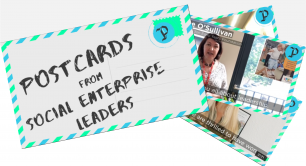Fit for the future: it takes ‘tough conversations’ to create a sustainable social business
What does it mean to build a healthy, resilient, sustainable organisation that’s able to do good and well at the same time? In the third of our podcast series in partnership with Buzzacott, our guests discuss why a social enterprise's longevity means much, much more than dusty risk registers – and why current ways of working may put the wider movement itself at risk.
Love podcasts? Don't miss out on ours! Catch up on all our podcasts and subscribe free on Apple Podcasts, Spotify or Soundcloud.
Growing a social enterprise – and growing its impact – often means taking risks. At the same time, making sure that a business is financially sustainable is essential to its survival. How to strike the right balance? What are the pitfalls to avoid, and how to know when the time’s right to be bold?
Pioneers Post’s managing editor Anna Patton and Buzzacott partner Eddie Finch talk to Zoe Portlock, co-founder and chair of the award-winning social enterprise Bikeworks, and Tej Dhami, managing director of The Change Coefficient, which provides social impact and investment advisory services. Together, they discuss how social enterprises and their investors can think of risk in a way that enables them to achieve greater social impact, while remaining sustainable.
Managing risk is more about the culture that you create
Dhami says having open conversations with all stakeholders about what risks the social enterprise is facing is essential: people across the organisation should understand the mission, challenges and changes needed. And sustainability should also be a concern for the wider social enterprise movement, she says, which suffers from a lack of diversity.
“Your biggest risk is mission drift,” says Dhami. “You need different voices in the room to prevent that from happening. And then we need far more representation from people with lived experience across our social enterprises and governance level.”
- Explore more how-to guides and expert insights for social enterprises in the Pioneers Post Business School
How can you mitigate risk without transferring it from one (the social enterprise) to the other (the investor)? Too often, the situation ends up being a zero-sum game, says Dhami, and we should think a lot more creatively about how to finance risk in the sector – considering other forms of capital, such as equity, for example.
“We use the wrong capital… we quite often put in debt, when we need equity-like capital, which is massively increasing the risk of a social enterprise. It's setting them up to fail.”
We often put in debt when we need equity-like capital, which is massively increasing the risk of a social enterprise. It's setting them up to fail
For Portlock – whose organisation took home this year's NatWest SE100 Resilience Award – managing risk goes beyond putting a risk register together and ticking some boxes. “It’s more about the culture that you create, and that you create with your governance team as well. To have the tools to manage risk means having the right mix of skills and experts on your board,” she says.
Figuring out the right approach to taking risks will be essential to tackle emerging social issues. To do so, Portlock says social enterprise leaders need to be bold, surround themselves with the right people – and above all, reconnect with their purpose.
Listen to the two-part episode above to find out more.
Podcast edited and produced by Laura Joffre.
Thanks for reading our stories. As an entrepreneur or investor yourself, you'll know that producing quality work doesn't come free. We rely on our subscribers to sustain our journalism – so if you think it's worth having an independent, specialist media platform that covers social enterprise stories, please consider subscribing. You'll also be buying social: Pioneers Post is a social enterprise itself, reinvesting all our profits into helping you do good business, better.



